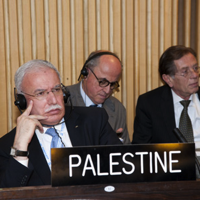Scarcely was the ink dry on Secretary of State Hillary Clinton’s interview with Time magazine in which she extolled U.S. global leadership than the Palestinian bid for membership in UNESCO called into question the secretary’s optimistic appraisal of American influence around the world.
Despite the claims of some pundits that a cabal of U.N. bureaucrats somehow engineered Palestine’s admission as a full member state of the organization, the ultimate responsibility lies squarely with the governments that cast their votes in Paris on Monday. Given the importance and sensitivity of the Palestinian question, it is highly unlikely that UNESCO ambassadors were operating without instructions from their home capitals when the matter came up for a vote.
American diplomats can point to one silver lining: The “no” votes included not only Israel and the United States, but some other key states in the U.N system, including Germany, a major financial donor, and Canada, a leading provider of troops for peacekeeping missions. The “special relationship” with Australia also held steady, with Canberra accepting the U.S. position that admission of a Palestinian entity into international organizations in the absence of a final settlement with Israel undermines the peace process.

